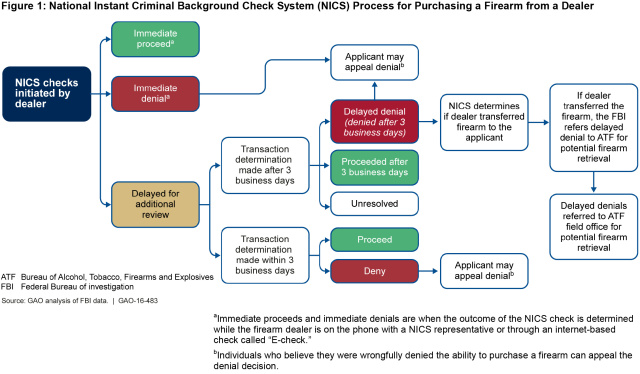Domestic Abuse and Firearms
Today’s WatchBlog looks at another GAO report—in this case, regarding FBI’s firearm background check system and domestic violence records. We examined this issue at the request of Congress, and today we share some of what we found about the National Instant Criminal Background Check System (NICS), and the challenges of conducting checks that involve domestic violence records.
How do background checks work?
Federally licensed firearm dealers run background checks—which are supposed to help keep guns out of the hands of people with domestic violence records and others who are disqualified by law from possessing firearms. Under federal law, there are generally 10 categories of people who are prohibited from receiving or possessing a gun, including people convicted of domestic violence and subject to a domestic violence-related protection order. The background check is intended to ensure that the buyer isn’t in one of the prohibited categories.
When a person buys a gun from a federally-licensed dealer, the dealer generally must request a background check through NICS before they can sell the gun. The buyer provides their name, date of birth, and other descriptive information, which is used to search for records that would prohibit the gun sale.
(Excerpted from GAO-16-483)
How long do they take?
The FBI completes the majority of background checks within 3 business days. However, some checks can take longer. Under federal law, if the check is not completed within 3 business days, the dealer may sell the gun to the buyer while the FBI continues researching records (unless state law provides otherwise).
Between 2006 and 2015, licensed dealers sold about 6,200 guns to people with domestic violence convictions and about 550 guns to people subject to a domestic violence-related protection order.
If the FBI eventually determines that the buyer is prohibited from having a gun, then the Bureau of Alcohol, Tobacco, Firearms and Explosives may need to retrieve any guns that have already been sold to the buyer.
What might cause delays?
We spoke with FBI and state officials, and found a number of challenges that could delay a background check involving domestic violence records:
Complex federal laws. In order to prohibit a gun purchase, a domestic violence conviction or protection order must meet multiple conditions. For example, the domestic violence conviction needs to involve the use or attempted use of force and an intimate partner relationship between the victim and offender.
Information difficulties. The FBI may need to obtain information from local agencies. Older criminal records can be especially difficult because they are only available on paper or have been destroyed, and officials from one state said it can take over a week to retrieve the necessary documents.
Varying definitions of domestic violence crimes. States differ on which crimes can be considered domestic violence. Some states consider “disturbing the peace” or “assault” as domestic violence, while others have specific “domestic violence” crimes that meet the federal criteria to prohibit gun possession.
States and the Department of Justice have already taken some actions to make records more readily available for background checks. We also made a recommendation that the FBI should monitor how long it takes to complete background checks, especially for each category. The DOJ then could prioritize their assistance efforts to states to focus on the categories, such as domestic violence convictions, that take longer to completely research during a background check.
- Comments on GAO’s WatchBlog? Contact blog@gao.gov.
GAO Contacts
Related Products

GAO's mission is to provide Congress with fact-based, nonpartisan information that can help improve federal government performance and ensure accountability for the benefit of the American people. GAO launched its WatchBlog in January, 2014, as part of its continuing effort to reach its audiences—Congress and the American people—where they are currently looking for information.
The blog format allows GAO to provide a little more context about its work than it can offer on its other social media platforms. Posts will tie GAO work to current events and the news; show how GAO’s work is affecting agencies or legislation; highlight reports, testimonies, and issue areas where GAO does work; and provide information about GAO itself, among other things.
Please send any feedback on GAO's WatchBlog to blog@gao.gov.





